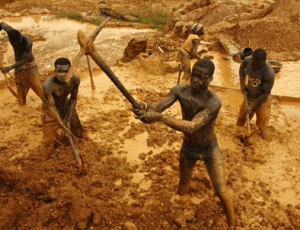Children ‘swimming’ in mercury and engaging in labour, drugs, and prostitution in galamsey sites
 Children in some galamsey sites in the Western Region have been engaging in labour, drugs, prostitution and encountering mercury to put body and soul together.
Children in some galamsey sites in the Western Region have been engaging in labour, drugs, prostitution and encountering mercury to put body and soul together.
A short documentary by OAfrica, a charity organisation and Tiger Eye PI on the horrors children experience by working in galamsey revealed that the children faced severe health hazards, limited access to education and human rights abuses.
In a Statement released by OAfrica after airing the five-minute documentary, it said: “Each mine site experiences ecological destruction, human rights abuse, illegal drugs, human trafficking and prostitution for underage children.”
It said the State should work and achieve the plan of formalising fully the small-scale mining sector and to eliminate child labour in galamsey.
“Our children are opting out of school. Working in the mines promises easy and quick money and that is keeping children as young as nine years out of school,” OAfrica said.
It said most children at the galamsey sites constantly encountered mercury, a substance causing irreversible damage to the central nervous system of the children.
The number of people involved in galamsey across the country is unknown, however, it is believed to be from 20, 000 to 50, 000.
Artisanal and Small-scale Mining (ASM) sector is also said to have one million people engaged in the sector with an estimated 4.5 million dependents.
The OAfrica called on the State to apply its 2020 National Action Plan to reduce mercury use in the ASM sector.
“Under the Minamata Convention on mercury, Ghana ratified it in 2017 and has committed to train healthcare workers on the effects of mercury, reduce mercury use in Small-scale gold mining, promote mercury-free methods and control the trade in mercury,” it said.
‘These actions ought to be implemented urgently to save our younger generation,” OAfrica said.
OAfrica is Ghanaian charity organisation that empowers children and young adults in need of care protection.
Source: GNA
